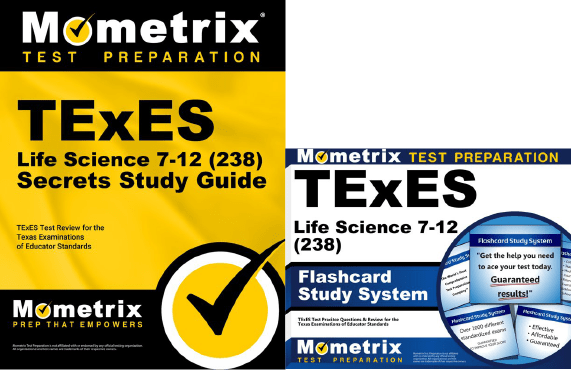If you need help studying for the TExES Life Science 7-12 exam or just want some more information about what the exam is like, you’ve come to the right place.
Click below to take a free TExES Life Science 7-12 practice test!
What’s on the Exam?
There are 100 multiple-choice questions on the exam, and the time limit is 4 hours and 45 minutes. There aren’t any scheduled breaks, but you’re free to take restroom breaks as needed.
Let’s take a closer look at the different sections of the exam.
1. SCIENTIFIC INQUIRY AND PROCESSES
15% of the exam
- Selecting and managing learning activities to ensure student safety
- The correct use and care of organisms, materials, technology, equipment, and natural resources
- The nature of science
- The process of scientific inquiry
- The history of science
- The impact of science on the daily lives of students
2. CELL STRUCTURE AND PROCESSES
20% of the exam
- The structure and function of biomolecules
- The way cells carry out life processes
- The growth and development of specialized cells, organs, organ systems, tissues, and organisms
3. HEREDITY AND EVOLUTION OF LIFE
20% of the exam
- The structures and functions of nucleic acids
- The continuity and variations of traits from one generation to the next
- The theory of biological evolution
- Evidence for evolutionary change during Earth’s history
4. DIVERSITY OF LIFE
20% of the exam
- Similarities and differences between living organisms
- The use of taxonomic systems to organize and interpret life
- The processes by which organisms maintain homeostasis
- The relationship between behavior and biology
5. INTERDEPENDENCE OF LIFE AND ENVIRONMENTAL SYSTEMS
15% of the exam
- The relationships between biotic and abiotic factors of terrestrial and aquatic ecosystems, biomes, and habitats
- The interdependence and interactions of living things in terrestrial and aquatic ecosystems
- The relationship between carrying capacity and changes in ecosystems and populations
6. SCIENCE LEARNING, INSTRUCTION, AND ASSESSMENT
10% of the exam
- Teaching science
- How students learn science
- The role of scientific inquiry in science instruction
- Monitoring and assessing science learning in the classroom, lab, and field
Computer-Adaptive Testing (CAT)
The TExES Life Science 7-12 exam is a computer-adaptive test. Basically, this means that the questions will become harder or easier as you go through the exam, based on how well you’re answering the questions.
For example, say you answered the first question correctly. The first question is of medium difficulty, so the next question will be slightly harder. Then, let’s say you answered the second question incorrectly. The next question would then be a medium question.
How to Register
To get started with your registration, you’ll need to create an account on the NES website. You can then register for the exam and schedule a test date through your account.
When you submit your registration, you’ll need to pay the $116 testing fee.
Exam Scores
The test is scored using a scaled scoring method. Here’s how it works:
You will need a score of 240 to pass the test.
The reason your raw score is converted to a scaled score is because everyone who takes the test is given a slightly different set of questions. Since everyone has a different arrangement of questions, and because some questions are harder than others, converting your raw score to a scaled score ensures a more even playing field.
FAQs
How many questions are on the TExES Life Science 7-12 exam?
The exam contains 100 questions.
What is the time limit for the TExES Life Science 7-12 exam?
The exam is timed at 4 hours and 45 minutes.
What is the passing score for the TExES Life Science 7-12 exam?
You’ll need to get a final scaled score of at least 240 to pass the exam.
How much does the TExES Life Science 7-12 exam cost?
The exam fee is $116.



 TExES Study Guide
TExES Study Guide TExES Flashcards
TExES Flashcards
